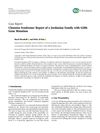 15 citations,
July 2012 in “Biological trace element research”
15 citations,
July 2012 in “Biological trace element research” Higher hair calcium to magnesium ratios and lower chromium levels in hair may indicate insulin resistance in Korean men.
 151 citations,
August 2010 in “British Journal of Dermatology”
151 citations,
August 2010 in “British Journal of Dermatology” Guidelines for diagnosing common hair loss include detailed history, clinical examination, and various diagnostic techniques.
 2 citations,
November 1995 in “American Journal of Obstetrics and Gynecology”
2 citations,
November 1995 in “American Journal of Obstetrics and Gynecology” Taking vitamin B6 corrected a pregnant woman's metabolic disorder, which changed her hair color.
13 citations,
April 2019 in “International journal of molecular sciences” Acyzol could help treat conditions caused by zinc deficiency.
 2 citations,
April 2019 in “Acta medica Philippina/Acta Medica Philippina”
2 citations,
April 2019 in “Acta medica Philippina/Acta Medica Philippina” People with alopecia areata often have lower vitamin D levels than healthy people.
 33 citations,
July 2021 in “Clinical, Cosmetic and Investigational Dermatology”
33 citations,
July 2021 in “Clinical, Cosmetic and Investigational Dermatology” Nanocarrier technology in cosmetics improves ingredient delivery and effectiveness while reducing side effects.
 December 2023 in “International Journal of Advanced Research in Science, Communication and Technology”
December 2023 in “International Journal of Advanced Research in Science, Communication and Technology” Semecarpus anacardium Linn. is a plant with many health benefits, including reducing inflammation, fighting cancer, and stimulating hair growth.
 1 citations,
October 2023 in “The Journal of nutrition, health & aging”
1 citations,
October 2023 in “The Journal of nutrition, health & aging” Higher hair levels of zinc and chromium were linked to less cognitive decline in very old people.
 21 citations,
May 2022 in “Frontiers in Cell and Developmental Biology”
21 citations,
May 2022 in “Frontiers in Cell and Developmental Biology” Hair growth and health are influenced by factors like age, environment, and nutrition, and are controlled by various molecular pathways. Red light can promote hair growth, and understanding these processes can help treat hair-related diseases.
 9 citations,
June 2000 in “Journal of The American Academy of Dermatology”
9 citations,
June 2000 in “Journal of The American Academy of Dermatology” Mutation in hairless gene may increase hair loss risk.
 2 citations,
June 2000 in “Journal of The American Academy of Dermatology”
2 citations,
June 2000 in “Journal of The American Academy of Dermatology” Mutation in hairless gene may increase hair loss risk.
 3 citations,
January 2023 in “International Journal of Molecular Sciences”
3 citations,
January 2023 in “International Journal of Molecular Sciences” Heat Shock Proteins are important in the development of Polycystic Ovarian Syndrome and could be targets for new treatments.
 1 citations,
August 2023 in “Frontiers in immunology”
1 citations,
August 2023 in “Frontiers in immunology” Traditional Chinese medicinal foods may help manage long-term post-COVID symptoms.

Kalya Research is an AI tool that effectively finds and analyzes alternative medicine literature, saving researchers time.
 November 2023 in “Curēus”
November 2023 in “Curēus” Melatonin may help manage PCOS by improving insulin sensitivity, hormone balance, and mood.
20 citations,
September 2015 in “Pediatric Annals” PCOS in teen girls should be managed with lifestyle changes and sometimes medication to improve symptoms and health.
 May 2022 in “Pharmacognosy journal”
May 2022 in “Pharmacognosy journal” Moringa seed oil may help prevent hair loss and promote hair growth.
 June 2022 in “International Journal of Advanced Research in Science, Communication and Technology”
June 2022 in “International Journal of Advanced Research in Science, Communication and Technology” The herbal shampoo promotes hair growth and strength without damage.
 January 2024 in “Annals of Dermatology”
January 2024 in “Annals of Dermatology” Hair transplants are highly satisfactory for treating female-pattern hair loss.
 April 2022 in “Journal of applied science and environmental management”
April 2022 in “Journal of applied science and environmental management” Alligator pepper seed extract improved wound healing in rats.
 November 2018 in “Springer eBooks”
November 2018 in “Springer eBooks” Children need early diagnosis and treatment for iron-deficiency anemia to prevent learning problems and promote health.
 June 2023 in “International journal on recent and innovation trends in computing and communication”
June 2023 in “International journal on recent and innovation trends in computing and communication” Combining multiple algorithms predicts hair fall more accurately than using single algorithms.
 July 2023 in “Journal of Clinical Medicine”
July 2023 in “Journal of Clinical Medicine” Tirzepatide might help manage PCOS in obese patients but needs more research to confirm safety and effectiveness.
 October 2023 in “Case reports in dermatological medicine”
October 2023 in “Case reports in dermatological medicine” A Jordanian family with Clouston syndrome has a common GJB6 gene mutation.
 October 2023 in “Animal production science”
October 2023 in “Animal production science” Vitamin A deficiency changes cattle hair structure, while pregnancy may improve it, suggesting hair can indicate cattle health.
 November 2023 in “Global journal of medical research”
November 2023 in “Global journal of medical research” Understanding the properties of hyaluronic acid helps improve its use in facial aging treatments.
 December 2023 in “Frontiers in endocrinology”
December 2023 in “Frontiers in endocrinology” Excess androgens may cause PCOS, not just be a symptom.
 January 2025 in “Applied Sciences”
January 2025 in “Applied Sciences” Sulforaphane from broccoli may help treat certain cancers, hormone issues, and hair loss.
 June 2024 in “IntechOpen eBooks”
June 2024 in “IntechOpen eBooks” Myo-inositol-based treatments greatly improve pregnancy chances for women with PCOS.
1 citations,
December 2021 in “Animals” Low zinc and selenium levels in sheep are linked to hair loss and thyroid problems.



























